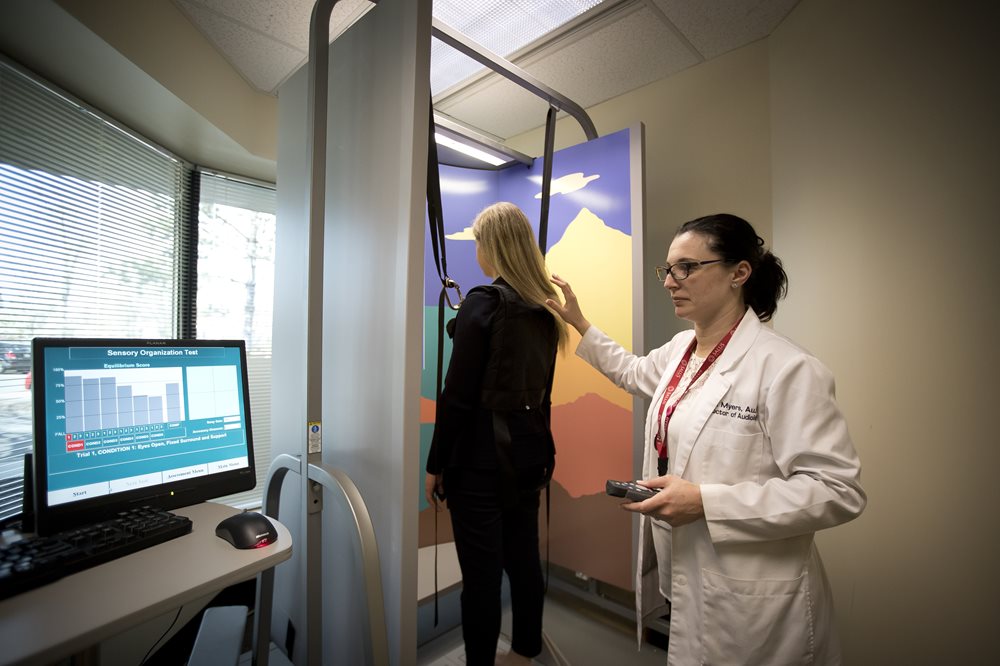Understanding Balance Disorders
What are balance problems?
Having good balance means being able to control and maintain your body's position, whether you are moving or remaining still. Good balance helps you walk without staggering, get up from a chair without falling, climb stairs without tripping, and bend over without falling. Good balance is important to help you get around, stay independent, and carry out daily activities.
People are more likely to have problems with balance as they age, but that isn’t the only reason these problems occur. According to a study conducted by Johns Hopkins University School of Medicine, individuals with untreated mild hearing loss were nearly three times more likely to have a history of falling.

What are the symptoms of a balance disorder?
If you have a balance disorder, your symptoms might include:
- Dizziness or vertigo (a spinning sensation)
- Falling or feeling as if you are going to fall
- Staggering when you try to walk
- Lightheadedness, faintness, or a floating sensation
- Blurred vision
- Confusion or disorientation
Other symptoms might include nausea and vomiting; diarrhea; changes in heart rate and blood pressure; and fear, anxiety, or panic. Symptoms may come and go over short time periods or last for a long time, and can lead to fatigue and depression.
What causes balance problems?
Balance problems are more common as people get older because they have more health problems in general and our balance system changes as we age. There are a variety of causes for vertigo. Two of the most common causes are inner ear infections called “Vestibular Neuritis,” and Benign Paroxysmal Positional Vertigo.

Vestibular Neuritis can occur following an upper respiratory infection, or cold. It typically affects one ear and causes the patient to feel severe rotational vertigo, spinning for up to 72 hours. This is followed by a few weeks of feeling imbalanced with symptoms improving gradually over a few weeks. Generally, the infection clears on its own, but sometimes steroids or antibiotics are prescribed. Vestibular and balance rehabilitation therapy is most helpful in restoring a person’s balance if they continue to have lingering symptoms. A variant of this is called Labyrinthitis, which affects both the hearing and balance portions of the inner ear.
Benign paroxysmal positional vertigo, or BPPV, is caused by tiny calcium crystal particles (otoconia) becoming dislodged and falling into one of the balance canals. Patients who have this often report brief, but intense spinning whenever they bend down, look up, or roll to one side or the other. The treatment for this is a procedure called the “Epley maneuver.” This procedure involves placing the patient’s head in a specific order of positions to move the otoconia from the balance canal and back into a place in the inner ear where they won’t cause any symptoms.
Other reasons for balance issues include:
- Circulation problems such as high or low blood pressure
- Head or neck injuries
- Infections
- Low blood sugar or dehydration
- Medicines
- Nervous system diseases including Alzheimer’s disease, multiple sclerosis and Parkinson’s disease
- Migraine headaches
- Stroke
 Those with symptoms impacting their balance should see an audiologist who specializes in vestibular diagnostics. Audiologists at the Pennsylvania Ear Institute perform an extensive battery of tests as part of the evaluation of the vestibular system and are a crucial part of the interprofessional team which includes physical therapists and otolaryngologists. Treatment options are available and vary depending on what causes the vertigo.
Those with symptoms impacting their balance should see an audiologist who specializes in vestibular diagnostics. Audiologists at the Pennsylvania Ear Institute perform an extensive battery of tests as part of the evaluation of the vestibular system and are a crucial part of the interprofessional team which includes physical therapists and otolaryngologists. Treatment options are available and vary depending on what causes the vertigo.
Audiologists at the Pennsylvania Ear Institute (PEI) are experts in diagnosing and treating balance and vestibular disorders. Using some of the latest, technical equipment available, audiologists will perform various tests to properly identify balance disorders.
If you or a loved one is experiencing vertigo, contact PEI for a balance evaluation.